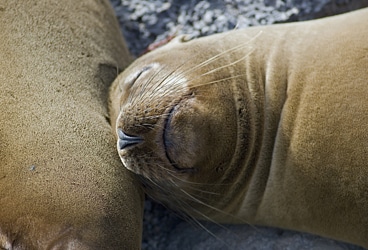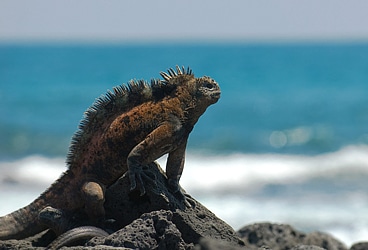Travel Tales: Who's The Fittest On The Galápagos?
The Galápagos Islands are a raw, dreamlike place — blood-sucking finches, lizards that swim, penguins at the equator and territorial bull sea lions who, properly provoked, will affix themselves to the legs of visitors, creating instant and discomfiting elephantiasis. On our first evening in the Galápagos our naturalist-guides speak both warning and wonder. When the lecture concludes, the dignified matron seated beside me dashes into the ship's library to clack out an e-mail to a friend: "There isn't much shopping in the Galápagos," she writes, "and we're not allowed to bring back any large animals."
Darwin was no more incisive, and it is Darwin's footsteps we will follow for the next week. But instead of puking over the railing of the Beagle, as Darwin so famously did, we will reside aboard the 237-foot MV Santa Cruz, where air conditioning hums like a shy symphony and the smell of fried shrimp and roasted lamb waft from the kitchen. Beyond the walls of our luxury liner, nature bleats, wars and couples on volcanic isles that make Alcatraz look like Club Med.
The following afternoon we visit our first island, riding ashore in skiffs like floppy-hatted conquistadors. The Galápagos are a birder's nirvana, and this particular island, Genovesa, fairly groans under the weight of birds. There are many birders in our group. A man beside me is so excited he issues a low keening sound. Once ashore, the birders make directly for a collection of bushes. At least I think they're bushes; there are so many birds on them it's hard to tell.
I walk up beside a khaki-vested fellow with a trash-can-size camera welded to his face. He's firing off machine-gun frames of a disinterested blue-footed booby perched six inches away. The birder is panting – maybe it's the acrid scent of guano baking on the stained bush – but the booby gazes into the massive lens as if admiring itself in a changing room at Macy's.
Finally the birder turns to me, his face flushed with orgiastic joy. I am certain he is going to kiss me full on the lips. "Fantastic!" he blurts. "My family isn't going to believe this!"
I nod quietly, seeing the purgatory his family will suffer upon his return, squirming through several hundred pictures of a single bird. I must admit that I, too, am fascinated, not by how this man can ignore the horrid smell radiating from this oven-baked bush, but by the booby's Zenlike insouciance.
This is the coolest thing about the Galápagos. They are the closest thing in this world to Eden. Imagine a zoo. Now banish the cages and imagine wandering among the animals without fear of harm, except perhaps for the exceptionally stupid – "Hey, Jimbo, watch what happens when I pull this lion's tail!" – in which case the drama of natural selection is played out before your eyes.
So it is in the Galápagos. On Genovesa I watch a bird alight upon a startled birder's arm as a sea lion wobbles over and nibbles on a man's shoes. The maliciously inclined might walk right up to a marine iguana or a blue-footed booby and poke it in the eye, though they would risk substantial fines and prison time. Darwin himself had no such penal or financial impediments, and so – though it sometimes goes unmentioned in high school evolution classes – the man treated the Galápagos denizens with rude familiarity. He rode the tortoises, plucked fi nches like plums for lunch and slung at least one marine iguana repeatedly into the sea, watching in amazement as, each time, it returned directly to him as if anxious for another chance at whirligig flight. It was a symbiotic relationship in which neither he nor they gave a damn. It has been 173 years since Darwin's first visit; I sense no change.
One evening on San Salvador island, I stand beside a pink-faced gentleman who regales me with an account of the multizillion-dollar company he built from matchsticks. Several dozen marine iguanas rest just off our feet. Perhaps they are listening, too. The nearest iguana expels a stream of seawater from its nostrils with a vociferous chuff, ladling salty phlegm on the entrepreneur's shoes.

I find the absolute indifference of the creatures of the Galápagos a joy to behold. Others catch the fever too, but no one phrases it more beautifully than my tablemate from the first night. She has forgiven the Galápagos its paucity of outlet malls.
"Isn't it wonderful how the animals pay no attention to us at all?" she beams as we pass each other in one of the ship's narrow halls. "It's like being innocent again."
That same evening we come ashore for a sunset hike along Santiago Island's shore. We pick our way through a minefield of sea lions, keeping a wary eye out for the bulls. Suddenly there is a great blurt. Immediately on its heels wafts a smell not unlike month-old salmon pulled from the fridge. "Mother of God," a woman says. Five yards away, 300 pounds of blubber gives a contented snort. Our guide raises his eyebrows. "Yes. The animals ... they go about their business."
After retreating upwind, he turns to us again. "Why do you think the animals of the Galápagos ignore us?" We stand pondering this amidst the snorting, honking, farting mass. "Because they are used to us?" someone finally says.
The trifling answer – because most of the animals have few, if any, natural predators – will come in a moment. But first our guide smiles: "It has nothing to do with us. In the scope of time, we are unimportant. Here, man only just arrived."
Ken McAlpine lives in Ventura, California, with his wife, Kathy, and their two sons. They pay much more attention to each other than the creatures of the Galápagos do.
